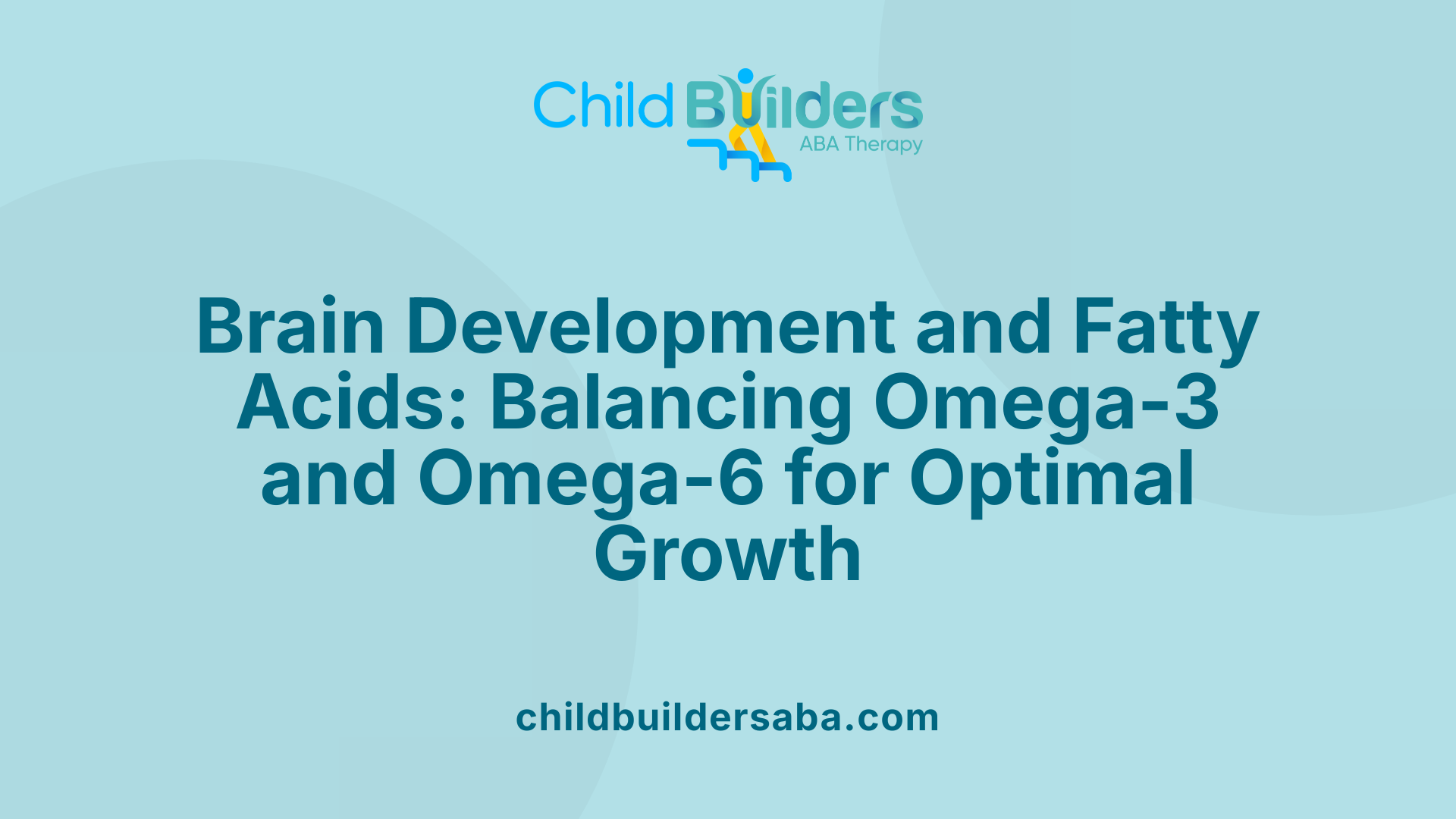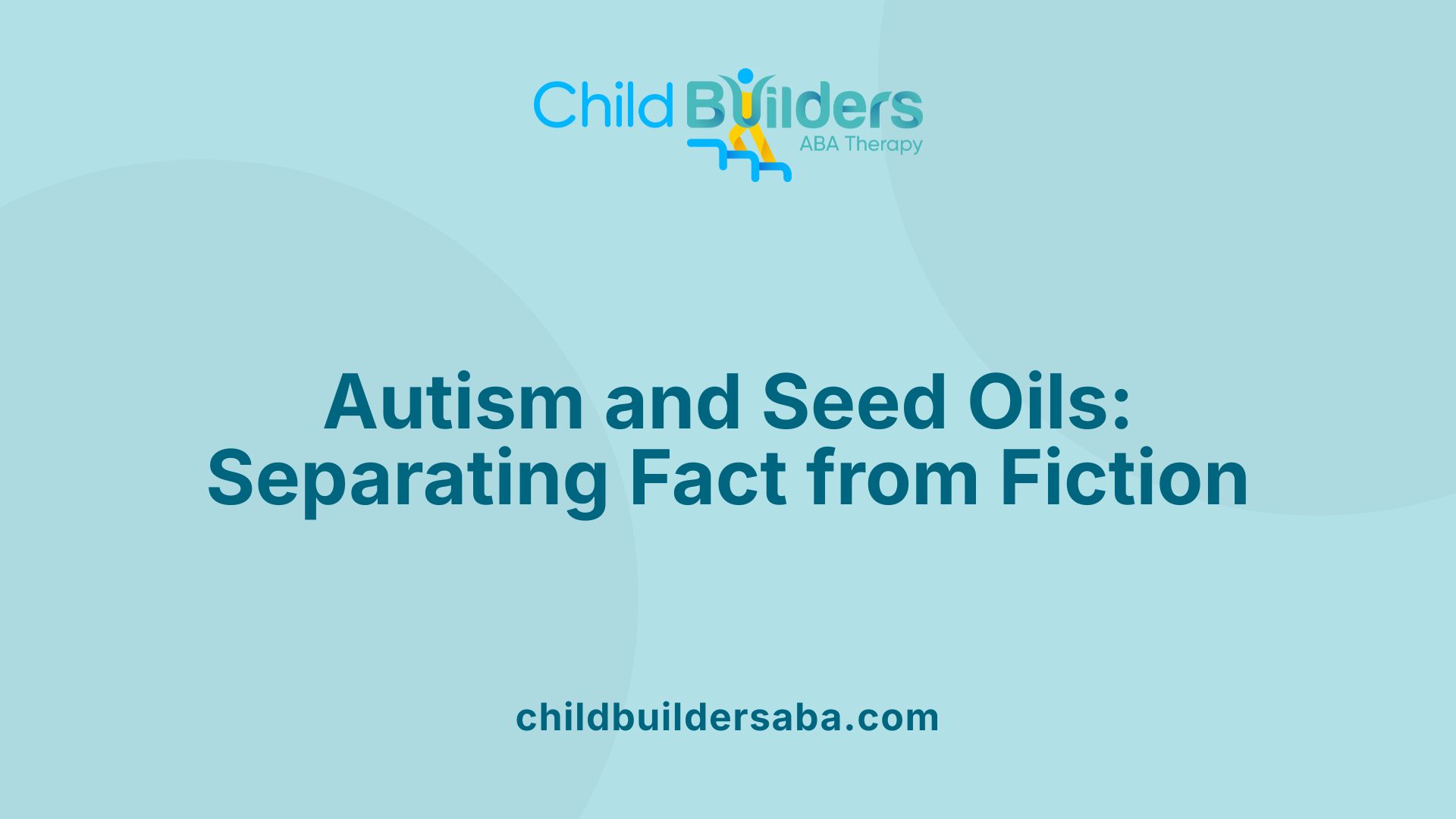Do Seed Oils Cause Autism?

Understanding the Scientific Perspective on Diet and Autism
The question of whether seed oils contribute to autism spectrum disorders (ASD) has garnered attention amid discussions on diet's role in neurodevelopment. While some studies suggest correlations between fatty acid intake and ASD symptoms, current scientific consensus indicates that seed oils—such as soybean and chia seed oils—are not directly linked to causing autism. Instead, research emphasizes the importance of balanced dietary fats and overall nutrition in neurodevelopment and health.
The Impact of Seed Oils on Overall Health and Chronic Disease

What is the current scientific understanding of the impact of seed oils, such as soybean and chia seed oils, on health?
Recent research challenges some common misconceptions about seed oils like soybean and chia seed oils. Contrary to past concerns, these oils are now recognized for their potential health benefits.
Seed oils are rich sources of essential fatty acids, particularly linoleic acid, an omega-6 polyunsaturated fat. These fats are vital for our health because our bodies cannot produce them on their own. Omega-6 fatty acids help reduce 'bad' LDL cholesterol levels, thus lowering the risk of cardiovascular diseases, strokes, and type 2 diabetes.
The idea that seed oils promote inflammation and oxidative stress has been largely debunked. When consumed as part of a balanced diet, seed oils do not increase inflammation. Instead, they can replace saturated fats like butter or lard, which are associated with higher rates of heart disease.
Public health guidelines increasingly recommend replacing saturated fats with polyunsaturated fats from sources like soybean and chia seed oils. Including these oils can contribute to better blood lipid profiles and overall cardiovascular health.
It is important, however, to choose minimally processed versions of these oils to retain their nutritional benefits. Most of their health advantages are seen when they are used in place of unhealthy fats, not in excess or overly processed forms.
In summary, contemporary scientific evidence supports the view that seed oils like soybean and chia seed oils can be healthful additions to a balanced diet, especially when used to replace more harmful fats. They play a role in cardiovascular prevention and overall well-being.
What role do omega-6 fatty acids play in reducing cardiovascular risk?
Omega-6 fatty acids, abundant in seed oils, are essential for maintaining healthy cholesterol levels. They help lower LDL cholesterol and can reduce the risk factors associated with heart disease.
Current scientific findings on seed oils' inflammatory effects
Most recent studies indicate that when used appropriately and in moderation, seed oils do not increase inflammation. The concern over inflammation linked to seed oils is not strongly supported by current research.
Health implications of replacing saturated fats with polyunsaturated seed oils
Replacing saturated fats with oils rich in polyunsaturated fats, like soybean, sunflower, and chia seed oils, supports heart health. This dietary change can lead to improved blood cholesterol levels and decreased risk of chronic diseases.
| Aspect | Effect | Supporting Detail |
|---|---|---|
| Cardiovascular risk reduction | Lowers LDL cholesterol | Replacing saturated fats with seed oils |
| Inflammation | Does not promote inflammation | When consumed in moderation within a balanced diet |
| Processing | Minimally processed oils retain benefits | Choosing cold-pressed or unrefined oils |
| Diet implication | Replacing butter/lard | Enhances diet quality and heart health |
Overall, current evidence advocates for the inclusion of seed oils like soybean and chia in a healthy, balanced diet. They offer beneficial fats that support heart health and can help reduce the risk of chronic diseases when used appropriately.
Exploring the Link Between Omega-6 Fatty Acids and Autism Spectrum Disorders

Observation of fatty acid profiles in umbilical cord blood and ASD
Research by scientists at the University of Fukui in Japan has shed light on the possible connection between fatty acids and autism spectrum disorder (ASD). They analyzed neonatal umbilical cord blood to measure levels of polyunsaturated fatty acid (PUFA) metabolites regulated by cytochrome P450 enzymes. The study identified that higher concentrations of specific metabolites, such as 11,12-diHETrE, derived from arachidonic acid, correlated with difficulties in social interactions. Conversely, lower levels of another metabolite, 8,9-diHETrE, were linked to repetitive behaviors seen in children with ASD. These findings suggest that the balance of certain fatty acids during fetal development may influence the severity and manifestation of ASD symptoms.
Studies analyzing the role of polyunsaturated fatty acids (PUFAs) in fetal development
Numerous studies have investigated how different fatty acids impact brain development during pregnancy. Polyunsaturated fatty acids, especially omega-3 and omega-6 varieties, are vital for neural growth and function. Omega-3 fatty acids like those found in fish (e.g., salmon, sardines) are known for their anti-inflammatory properties, potentially supporting healthy brain development. However, an excess of omega-6 fatty acids, prevalent in seed oils such as soybean and sunflower oil, might promote inflammation. The dietary ratio of omega-6 to omega-3 is crucial, with modern Western diets often skewed towards omega-6, which could influence neurodevelopmental outcomes.
Research on metabolites like diHETrE and their association with ASD symptoms
Metabolite levels in umbilical cord blood offer potential biomarkers for ASD. Specifically, diHETrE, a dihydroxy fatty acid from arachidonic acid, was studied extensively. Elevated levels of 11,12-diHETrE have been associated with social interaction deficits, whereas reduced levels of 8,9-diHETrE relate to repetitive behaviors. These metabolites are involved in inflammation pathways, implying that imbalances in fatty acid metabolites during fetal development may contribute to ASD symptoms. Monitoring these compounds at birth could someday help predict susceptibility and aid early intervention.
Inconclusive evidence regarding causality between seed oil intake and autism
While intriguing associations exist, current scientific evidence does not establish a direct causal link between seed oils, particularly omega-6 fatty acids, and autism spectrum disorders. Many studies are observational and highlight correlations rather than causation. Some research suggests that high maternal intake of omega-6s might be associated with a decreased risk of autism, while low omega-3 consumption appears to pose a risk. Animal studies using soybean oil indicate potential effects on gene expression related to brain development, but these are preliminary and not definitive for humans. Therefore, more comprehensive research is needed to clarify any causal relationship, and at present, seed oils are not confirmed as a direct cause of ASD.
The Role of Omega-3 and Omega-6 Fatty Acids in Brain Development and Behavior

What role do omega-3 and omega-6 fatty acids play in brain development and behavioral outcomes related to autism?
Omega-3 and omega-6 fatty acids are vital fats found in neural tissue, impacting brain structure and function. These polyunsaturated fats are essential for building neuron membranes, facilitating proper neuronal signaling, and supporting neuroplasticity—the brain’s ability to adapt and reorganize.
In early development, especially during pregnancy and infancy, these fatty acids are crucial. Omega-3s, particularly DHA, support neural growth, cognitive development, and visual acuity. Omega-6s, such as linoleic acid, help structure cellular membranes but require balance with omega-3s.
Imbalances—often seen in Western diets—favor high omega-6 consumption, which can promote inflammation. Excessive omega-6 relative to omega-3 may lead to neuroinflammation that interferes with normal brain function. Such neuroinflammation has been linked to behavioral issues common in autism spectrum disorder (ASD), including aggression, hyperactivity, and social withdrawal.
Research suggests that supplementing omega-3s might help reduce some ASD symptoms, like hyperactivity and social difficulties. However, studies show mixed results, highlighting the importance of balanced intake.
Ensuring adequate omega-3 intake during pregnancy, early childhood, and beyond is critical. These periods represent sensitive windows when proper nutrition can support healthy neurodevelopment, potentially mitigating the severity of behavioral symptoms associated with ASD.
Most importantly, maintaining a dietary balance between omega-3 and omega-6 fatty acids may influence inflammation levels and overall brain health, impacting behavioral and cognitive outcomes.
Myths, Misconceptions, and Scientific Facts Regarding Seed Oils and Autism

Does scientific evidence support a causal relationship between seed oil consumption and autism?
Currently, there is no conclusive scientific proof that consuming seed oils directly causes autism. Many studies have explored the connection between fatty acids—mainly omega-6s found in seed oils like soybean, corn, and sunflower oils—and autism spectrum disorder (ASD). These studies often show that children with autism tend to have lower-than-recommended levels of omega-3 and omega-6 fatty acids. Additionally, some research indicates that maternal intake of omega-3s and other nutrients during pregnancy may help protect against developmental disorders, but results are mixed.
Importantly, while associations between high omega-6 levels and increased ASD symptom severity have been observed, these do not establish direct causation. The high content of omega-6 in seed oils is often pointed out, but most health concerns relate to excessive consumption of ultra-processed foods containing these oils, rather than moderate use of seed oils in cooking.
In essence, current scientific evidence suggests that seed oils are part of a complex nutritional picture. They may influence neurodevelopment indirectly through effects on inflammation and gut health, but they are not proven to be a direct cause of autism. More detailed, controlled research is needed to determine if or how these oils impact ASD risk.
The importance of balanced nutrition and whole foods in neurodevelopment
Achieving a balanced intake of omega-3 and omega-6 fatty acids is vital during pregnancy and childhood. Foods rich in omega-3s, such as fish like salmon, sardines, and anchovies, are known to support brain development and help reduce inflammation. Conversely, diets high in processed foods and seed oils can skew this balance toward omega-6 dominance, potentially promoting inflammation.
Focusing on whole, unprocessed foods and healthy fats—such as extra-virgin olive oil, avocado oil, and nuts—can promote better health outcomes. Maintaining a balanced diet not only supports optimal neurodevelopment but also helps prevent inflammation-related health conditions.
In summary, while seed oils are widely used and generally safe in moderation, it’s essential to prioritize a diet based on whole foods and healthy fats. This approach supports overall growth and development, including neurological health, without resorting to unfounded fears about specific ingredients.
| Food Source | Fat Type | Omega Content (per 100g) | Notes |
|---|---|---|---|
| Walnuts | Omega-3 | 9.20 g | Rich in plant-based omega-3s |
| Sardines | Omega-3 | 0.90 g | Excellent for brain health |
| Tuna | Omega-3 | 0.92 g | Commonly consumed fish |
| Sunflower Oil | Omega-6 | 63.3 g | High in omega-6, used in processed foods |
| Corn Oil | Omega-6 | 56.0 g | Common cooking oil |
| Soybean Oil | Omega-6 | 53.0 g | Widely used but high in omega-6 |
Understanding the roles of different fats and practicing moderation with processed foods can help support healthy neurodevelopment and overall wellness.
Summary and Final Insights
Based on current scientific evidence, seed oils such as soybean and chia seed oils do not cause autism. The relationship between dietary fats and neurodevelopment is complex, involving factors like overall diet quality, balance of fatty acids, and genetic predispositions. While some studies observe associations between fatty acid levels—particularly omega-6—during pregnancy and in children with ASD, these do not establish causation. It is important to focus on a balanced diet that includes sufficient omega-3 fatty acids, minimizes processed foods, and emphasizes whole, nutrient-dense options. Continued research is essential to deepen our understanding of diet’s role in autism, but at present, the science does not support the idea that seed oils directly cause autism.
References
- Widely consumed vegetable oil leads to an unhealthy gut
- Researchers say discovery points to possible autism cause in children
- Seed Oils: Are They Actually Toxic?
- Omega-3 and omega-6 polyunsaturated fatty acid intake and ...
- Autism and Omega-3: How the Brain is Positively Impacted
- Autism and Diet: How Does Nutrition Affect Health?
- Eating Healthy Fats During Pregnancy May Reduce Baby's Autism ...





































































































